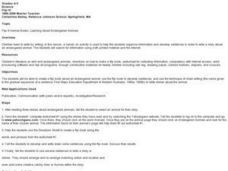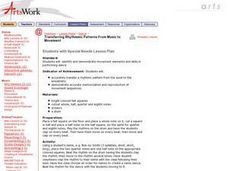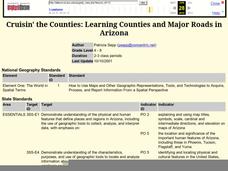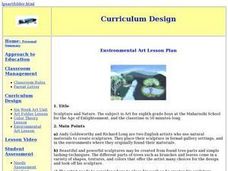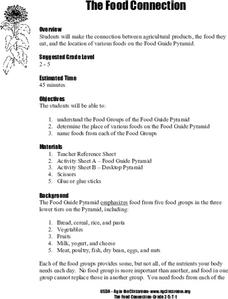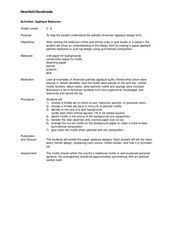BBC
Victorian Lesson Plan
How has England changed? Are the streets the same today as they were in the time of the Tudors? Fourth year students compare and contrast the Victorian & Tudor streets to the streets of today. They research biographical information...
Curated OER
Just Pass It
High schoolers investigate a minimalist dance using two props, a chair and a pillow. They demonstrate transferring a prop from one person to the next in a task-like manner. Then they work as a group to transfer a prop with restrictive...
Curated OER
How Deep Do They Dive
Students calculate and graph the diving depths of various types of whales. They cut out and glue whale pictures on a worksheet to represent the diving depths for five whales, and discuss how people use graphs to communicate.
Curated OER
Highs And Lows
Students experiment to examine high and low pressure areas. They investigate why a high pressure area seeks a low pressure area.
Curated OER
Animals
Students become familiar with the need for categorizing scientific information, in this case, animals. They categorize the 5 groups of animals in a collage and answer questions about each.
Curated OER
Division of Labor
Students explore cottage industry and division of labor. They study the Industrial Revolution and its effects on workers and productivity.
Curated OER
Fractions Everyday
Students investigate fractions through interactive videos and hands-on activities and class made models.
Curated OER
A Slice of Pi
Math pupils, by viewing a video, discover the history of pi and some of the applications of its uses in the world today. They conduct an experiment by measuring the diameter and circumference of various circular objects to calculate...
Curated OER
What Happens to the Food You Eat? The Digestive System
Students observe a video displaying body parts and functions of the digestive system. They make drawings of the digestive system from their observations. They act out a short play involving body parts.
Curated OER
Flip It!
Learners research an endangered animal using both printed material and the Internet. They organize their information and develop sentences to write a story to create a flip-it book. A worksheet is embedded in the instructional activity...
Curated OER
A Different Point of View
Fourth graders imagine what North Carolina looks like from the air. Looking at a map, they list the different kinds of views we might find, (i.e., beach, mountains, cities, farms, etc.) then attempt to draw their own version of a map.
Curated OER
Sculptures from the Skies
Fourth graders research the design of the aircraft used by the Wright Brothers at Kitty Hawk. They design a sculpture of aircraft using recycled materials.
Curated OER
Transferring Rhythmic Patterns From Music to Movement
Students identify and demonstrate movement elements in relation to musical notation. They clap to rhythms, beat on drums, match musical notes to speech patterns and use the rhythms of the their names to create a dance.
Curated OER
Area and Volume
What is the difference between area and volume? Have your charges build models of square centimeters, square inches, square feet, square meters, etc. It's definitely challenging, but there is no better way to learn than by trying...
Curated OER
Cruisin' the Counties: Learning Counties and Major Roads in Arizona
Learners examine Arizona counties and use the themes of location and movement to develop an Arizona map.
Curated OER
Work Patterned on Mondrian
Young scholars study and describe aesthetic properties in art. They use criteria to participate in critiques.
Curated OER
Sculpture and Nature
Eighth graders examine and discuss the environmental art of Andy Goldsworthy and Richard Long. They view images, observe how to lash tree materials together, and demonstrate how to lash tree materials.
Curated OER
What's a Capacitor?
Learners explain concepts of charge storage, how a capacitor works and how DRAM uses capacitors to store memory. They construct a capacitor and use a multimeter with capacitance meter capability to measure the stored charge in the...
Curated OER
The Food Connection
Students examine the connection between the foods on the food pyramid and agricultural products. They identify the food groups, discuss foods from each group, complete two handouts, and construct a desktop food pyramid, placing foods in...
Curated OER
Go Fish
Here is a good art lesson plan on creating colorful versions of fish. After studying images of a variety of fish, young artists choose one that they want to create an image of. Using some high-quality materials, they create their...
Curated OER
Appliqué Bedcover
Students examine the process of creating patriotic American appliqué designs. They research American patriotic appliqué quilts, list American symbols, and design and create their own paper appliqué designs.
Curated OER
Now You See Me, Now You Don't
Bioluminescence fascinates most upper elementary scientists. Display images of different glowing deep-sea organisms and discuss their environment. Young biologists then experiment with images and different colors of filtered light. In...
Other popular searches
- Cutting With Scissors
- Scissors Practice
- Rock Paper Scissors
- Gel Electrophoresis Scissors
- Dna Fingerprint Scissors
- How to Use Scissors
- Rocks Paper Scissors
- Drawing With Scissors
- Use of Scissors
- Creating Art With Scissors













